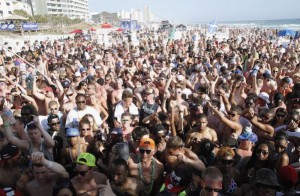Spring Break and Sexual Assaults: An Inevitable Trend
Three people have been arrested in relation to a gang rape occurring in Panama City, FL during spring break. How did the authorities find out about the rape? A video that went viral of the alleged rape got into the hands of the Panama City Beach police. Hundreds of onlookers watched as a woman went in and out of consciousness while she was raped multiple times. According to the authorities in Bay County, this isn’t the first, second, or even third video they’ve seen of this type of incident.
 New Provisions Ban Alcohol on Beaches in Bay County, FL
New Provisions Ban Alcohol on Beaches in Bay County, FL
During spring break this year, the Bay County Sheriff’s Office made triple the amount of arrests than they did last year in the same time frame. Crimes involving drugs, weapons, and assaults are rampant among spring break goers looking for a good time with no consequences.
The Bay County Commission and the Panama City Beach Council declared a no alcohol on beaches policy between the dates of March 1 and April 18. They’re hoping to lower the number of sexual assaults that occur during spring break, but is alcohol the only issue?
The Problem Goes Beyond Alcohol
Yes, alcohol is a huge contributor in sexual assaults. However, our culture is the main issue.
The objectification of women is widespread in our society. Women are largely seen as sex symbols: nothing more than a body with a voice that needs to be silenced. If women are allowed to be seen as mere objects, then they will inevitably be treated as such.
Women are sexualized in all facets of life–not only on the beach, but even in unexpected venues including the world of politics. Consider news stories about Hillary Clinton: instead of journalists asking her what she plans to do about issues like ISIS and health care, she gets critiqued for her clothing. I never realized her outfit had anything to do with her politics. I guess in our country, this unfortunately does matter if you’re a woman.
The most detrimental way women are objectified is in the criminal justice system. More times than not, women who report a sexual assault are asked, “What were you wearing at the time of the incident?” and “Well were you drinking?” Women are much too often criminalized rather than victimized when reporting a sexual assault crime.

Comments